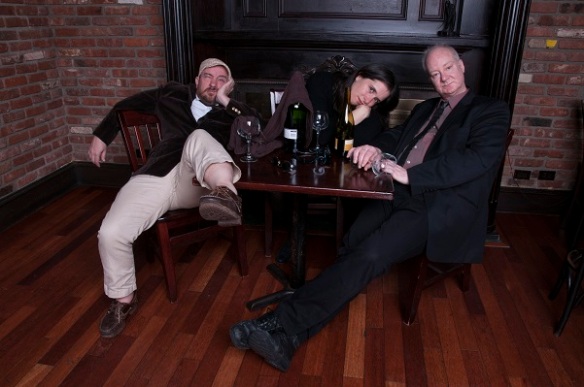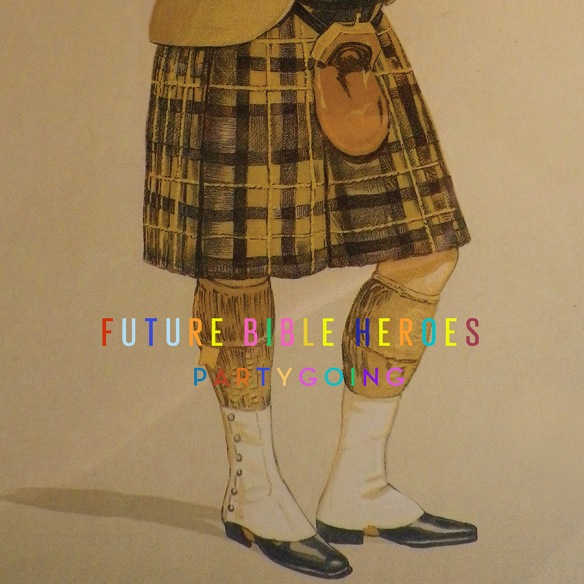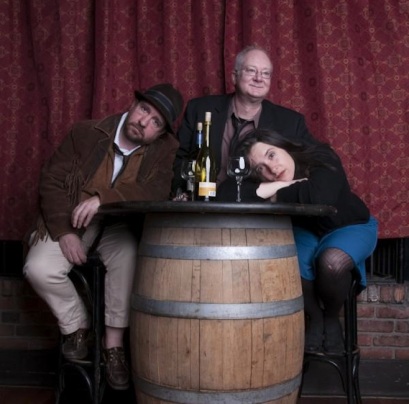Future Bible Heroes ed  After taking some time off between Rogue Wave records, Zach Schwartz (aka Zach Rogue) and company are back on tour supporting their recent LP, Nightingale Floors, their fifth full-length, and first on Vagrant Records.
After taking some time off between Rogue Wave records, Zach Schwartz (aka Zach Rogue) and company are back on tour supporting their recent LP, Nightingale Floors, their fifth full-length, and first on Vagrant Records.
While Permalight, Rogue Wave’s 2010 release was seen by many to be a marked departure from the band’s signature sound— including Rogue, himself, Nightingale Floors is a return to form. Together with longtime collaborator, Pat Spurgeon, Rogue Wave are back with that summertime sound that has come to define the band’s catalogue. But look deeper and you’ll realize that the poppy hooks and inherent hopefulness that ease into their breezy melodic instrumentation often mask the melancholy of the lyrics that lurk underneath their swooning harmonies. No strangers to bad luck and tragedy, besides his own personal health problems, Rogue lost his friend and former bassist in a complications following a house fire, and Spurgeon almost lost his life from kidney failure.
I was able to catch up with Zach Rogue as he set off for tour to talk about his new record, and the ups and downs that lead that amazing Rogue Wave sound.
 Hello, Nolan? Sorry I missed your call I was at this gas station. My phone sucks and when I get a phone call and a message my phone freezes up and I cant get a call right back. It’s really weird.
Hello, Nolan? Sorry I missed your call I was at this gas station. My phone sucks and when I get a phone call and a message my phone freezes up and I cant get a call right back. It’s really weird.
That is strange. Where are you at right now?
I’m at a gas stop somewhere near Minneapolis. There’s a bumper sticker in there that says, “I Love my country, but my president is a moron.” And there’s another one that says, “Sorry about your face, but nice tits.” That’s another one. It’s a really highly evolved country. Wow!
You don’t think the president one is from 8 years ago?
It looks shiny and new. What can I say?
It seems you took some time between touring and recording since the last record. What were you up to? I know you had a solo project…
Yeah, I did. I needed a break in general, you know. I did this band called Release the Sunbird and did a little touring and an album and EP with them. It was a really amazing time and the people I recorded with were ridiculous musicians, and the band I toured with was a whole new set of friends and I got to sing with a new set of singers that were amazing. I also scored a TV show for HBO [On Freddie Roach] and that was really nice. I did a lot of ambient music and stuff I wanted to do for a long time. I think both of those experiences are what led me to make Nightingale Floors.
You said you needed a break, how did you mean that?
Just from everything. Just being on the road. With Permalight, to play those songs live was not really easy to do and it didn’t seem like it sounded like us too much. I felt like I didn’t like the trajectory of where we were going live and needed to take some time away from that and get some perspective. If we were going to keep going as a band, I needed some perspective and it needs to be more closely aligned with us.
What do you think led the songs from Permalight to take that departure in sound?
Everything is a reaction to something else. We started to do Permalight and I had all of these physical problems where I couldn’t move my body and I had lost feeling in my hand, so I felt that I wasn’t able to do any playing. At the time I wanted to make really rhythmic dance-beat music because I was excited to be playing again. The problem is we are not really a dancey band. Live, trying to have click-tracks and trying to have sequenced stuff—it’s great, but it’s not great for us. It’s a great experiment for us when we’re in the studio and heading that direction, but we landed up spending too much time on that record. We landed up spending four months tracking it. That’s too long. We’re not supposed to have a bunch of control in the studio; we’re supposed to be a little more loose. That’s our sound, and it ebbs and flows. That’s how we play, we don’t have any perfection; we have expression. It was an experiment and I’m glad we did it, but I think Nightingale Floors was much closer to how we play and the production values are more in line with what we like.
So is the label change just part of the restart for you guys? What was that decision based on?
I love the people at Brushfire and they’re great people and we have a great relationship with them. I consider them friends. It was a definite amicable separation. They have a deal with Universal that made it impossible for us to stay there. I don’t want to have anything to do with Universal. Not, Brushfire—I love them. It became clear that when we all got back together and were working on new music that it’d be good to go somewhere else where there would be a clean slate and wouldn’t be any fancy Universal-like accounting practices, where you’re under the sum of some unscrupulous corporation. We just really like Vagrant and they’re great people who put out good music. We have been in touch for years, so it seemed like a good idea. They’re very supportive of us as a band and we just really like them.
There are new players on this record as well, right?
Yeah. There are, but there always is. Ha, there always is.
So the bands ever-changing, but you always have the core?
Yeah, it’s always about me and Pat and that happened ever since we met. Mark who played bass on the record toured with us before, so he’s not that new. Then we just brought in some friends. Pete, from Peter Wolf Crier is one of the best guitar players I know. Our friend Jules came in and I knew we wanted some beautiful female voices in there. So me and Pat and Mark spent month demo-ing stuff and did a lot of live tracking. The way it usually works, no matter what we’re doing, it’s me and Pat messing around with songs—either on parallel or if I’m doing a vocal track he’s on some weird instrument tracking onto his computer or 4-track machine. We pull all the tracks together we like and mix them up… like salad. We’re a salad band. A quilty, salady band.
So you wouldn’t say there’s anything that ties them all together besides time and place?
You mean is there any reason that all of these songs are on this record? That’s up to you. You’re the writer, it’s up to you to say whatever you want about that. These are songs about letting go—of the past and trying to have control over things that you can never, ever control. You can’t control the fact that you’re going to die. Everyone you know is going to and all you can do is just accept it and really live. And it’s okay. I think there’s a lot of that. Every song has some little thing. They’re not completely linked like that, but I think ultimately I think it’s about trying to let go.
Do you find it hard to fit these deeper messages into songs that sound inherently summery and happy?
The way something comes out… happy is a relative term. When I hear certain songs, I wouldn’t necessary that I’m feeling happy when I hear a song. You can’t set out to know what the end result is til its done. You don’t know the overall feel of a song until it’s done. I don’t think you know where the plot is going to go when you’re writing a book. You don’t know, and you don’t know until you find your way around. That’s how these songs are. Maybe I was crying in my whiskey when I was writing it, but maybe it ultimately ended up different than that. With music there’s always a duality of what’s being said and how it’s being said—or what’s being said and how the listener feels when they hear it. You can hear a sad and brutally honest song, but it can make you ironically feel good. It’s like Elliott Smith is sometimes. You can feel happy through someone’s misery, so if you feel that these songs sound happy, I’ll tell you that’s crazy because I wasn’t talking about happiness. Maybe the melody feels good if you like those melodies, but those are different things. But that’s why music is interesting. That’s why people like music and that’s why we play music, because it has that duality and multiple perspectives and you want to hear it over and over.
What’s the significance behind the album’s title?
Do you know what that is?
What a Nightingale Floor is? No I don’t. I thought it was just your term.
Well if you do some research you’ll get an idea, I imagine.
Is that Thomas Campbell’s art on the cover?
No, it’s Andrew Schoultz. I’ve actually been asked before if it’s Thomas, and I love his work as well. Andrew Shultz is amazing. Go to his website [http://www.andrewschoultz.com]. He has some great books and is a super-talented dude.
Is it strange when people focus on the bad luck/tragic occurrences of the band’s past, or do you think that helps people identify with you and the idea that bad things happen to everybody? Or do you think it takes away from the music?
I wonder about that. I think it’s a little of both. I think when people write about music there’s a tendency to cling to a narrative thread that’s easier to talk about than talking about how you feel when you hear the music. But those things are intertwined with us and our records. So if we didn’t have those things in our lives, we probably wouldn’t have made the music that we’ve made. Everything is a reaction to what we see or feel around us. I would hope that people are more interested in the music than the stuff that’s happened to us. I’m not really sure what to say. I can’t lie and say that didn’t happen, but it’s also the stuff that gives us strength and makes us want to go on, even though it’s a shitty business to be in. What happens is you travel around and you meet people who have had things that happened in their life and sometimes if they like our band then that music helps them and you can build a community and relationships and understandings that all make it worthwhile.
Do you still have the physical pain when you’re playing?
Yeah, but I try and bandage it. It’s not as bad as it was, which is great. There are some things—my hand is still numb, but I’ve learned to deal with that and I’m not bedridden—well not yet.



